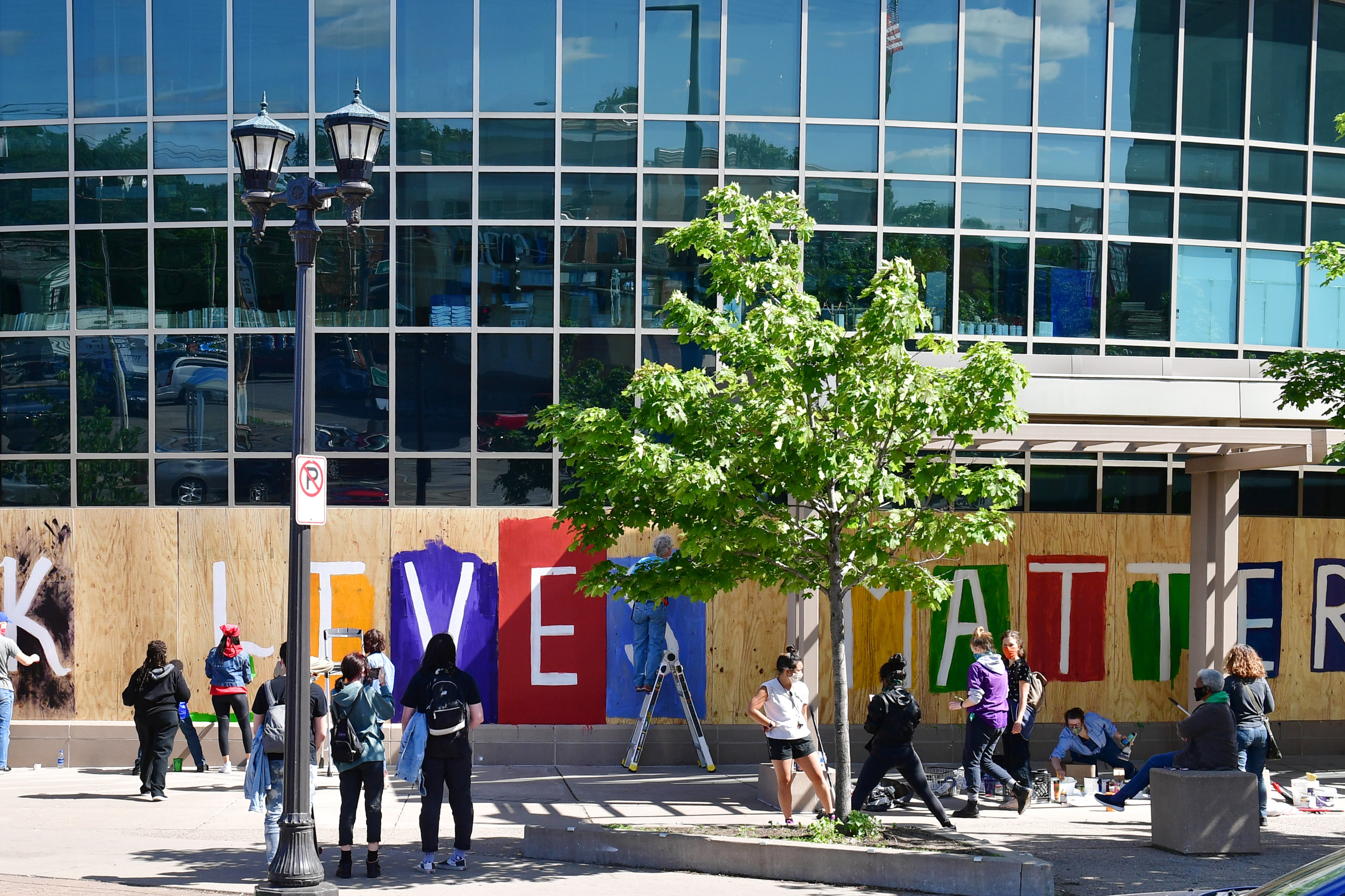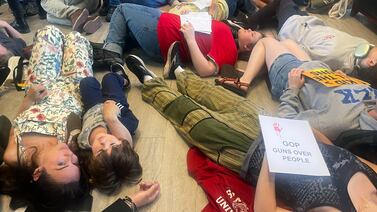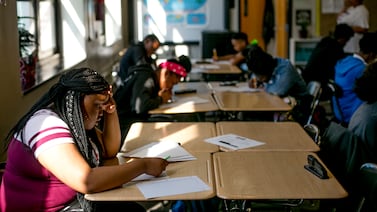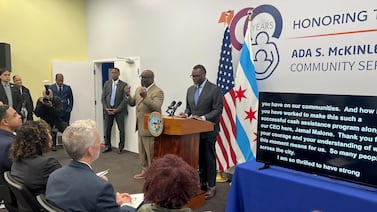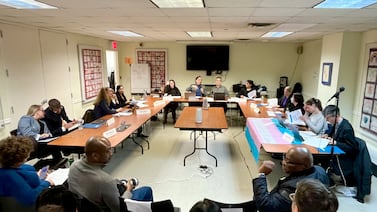As the country convulses after the latest incident of police violence against a black American — and the protests and unrest that have followed — schools and education organizations are responding.
Teachers are hosting classroom discussions as school district leaders denounce racism and activists renew calls for schools to cut ties with police.
Here’s what we’ve seen.
Teachers are discussing the issue of police violence with students.
Some teachers are holding lessons virtually on Brown v. Board of Education. Others are finding time for check-ins with students who are struggling. Still others are deep in planning lessons on criminal justice reform for the fall.
Though teachers are taking a variety of approaches to discussing George Floyd’s death, protest movements, and racism with their students, many agree that silence is not an acceptable option.
“For many schools that serve predominantly black and brown low-income communities, moments like now are why we teach,” said Leslie-Bernard Joseph, head of a Brooklyn charter network.
But this has been made all the more challenging by the necessity of remote instruction. “Usually, I’m there to process with students,” Evan Shinn, a Seattle high school teacher, told Education Week. “There’s something about showing up and being in that space together and trying to figure out what it’s going to look like together, and we don’t have that space.”
School system leaders are highlighting their efforts to combat systemic racism through education.
Many leaders of large school systems — particularly those that serve mostly students of color — have made statements of their own.
“There is just so much loss,” said Aleesia Johnson, the superintendent of Indianapolis Public Schools. “And so in the midst of that, I want to remind all of our students — but especially our black and brown students — that you are so valued. You are loved. You are brilliant. You are powerful. You are magic. And we are so proud of you.”
“Today, I’m writing to you as a mother of a black boy who is worried for him, and the millions of other black boys in our country,” wrote Janice Jackson, head of the Chicago Public Schools, in a note to families. “If we are going to progress as a society, this moment must lead us to confront racism — in all of its forms — on a daily basis.”
District leaders in Los Angeles, Houston, Miami-Dade County, Broward County (Florida), Milwaukee, Cleveland, St. Paul, and Atlanta, among others, have spoken out.
One person who has been notably silent: Education Secretary Betsy DeVos. A spokesperson did not respond to a request for comment.
Advocacy organizations condemned racism and police brutality. A few made financial donations to support criminal justice reform.
Teachers unions, school board associations, parents groups, associations of school system leaders, education-focused civil rights organizations, education researchers have all issued statements. The exact message varied, but many condemned police violence, stated that black lives matter, and promised to ground their own work in anti-racism.
Some called for action while acknowledging the limits of words alone.
“Saying ‘Black Lives Matter’ simply is not enough,” wrote Shaun Harper, the president of the American Educational Research Association. “As a community of researchers, we must unite to take bold, evidence-based action that exposes and ultimately ends the catastrophic police killings of unarmed Black people.”
A couple of organizations have announced donations to groups working on these issues. NewSchools Venture Fund, an education funding group, donated a total of $250,000 to two groups — the Equal Justice Initiative and Color of Change — working to reduce incarceration and excessive punishment. The board of the KIPP charter network’s DC branch will match donations from KIPP DC staff, families, and alumni to the NAACP Legal Defense and Educational Fund and the police reform organization Campaign Zero, up to $25,000.
Meanwhile, the two national teachers unions, American Federation of Teachers and the National Education Association, signed onto a letter by civil rights groups calling for specific policing reforms.
In a few places — most notably Minneapolis — there’s a renewed push to cut school districts’ ties to police and schools.
Soon after Floyd’s killing, a school board member in Minneapolis proposed cutting ties with the local police department — and the school board voted to do so Tuesday evening. A Denver school board member has made a similar call, as has the Chicago Teachers Union.
The Advancement Project, a national education-focused civil rights group, is pushing for all districts to cut ties with police.
“There have been too many examples across the country of police violence against students in our school hallways and criminalization of students of color,” said the Advancement Project’s Judith Browne Dianis. “All school districts should heed the moment.”
It’s not clear how much traction any of this will gain — or to what extent it will turn into a broader movement — particularly since police presence in schools has ratcheted up in recent years after high-profile school shootings. The share of schools with security staff increased sharply between 2013 and 2017.
Research has found that police presence both in and out of schools can harm students’ academic progress.
A few school districts are offering new teaching materials for teachers and parents.
In Chicago, the school district assembled an 11-page toolkit, titled “Say Their Names,” with guidance for talking with students about racism, police violence, and the Black Lives Matter movement. It also includes specific help for tackling these issues virtually, and reminds teachers that students should be able to opt out of conversations. “No matter how well-planned and expertly-facilitated these conversations are, they can be re-traumatizing to Black youth,” the toolkit notes.
Saint Paul Public Schools, located not far from where Floyd was killed in Minneapolis, also put together a guide to help teachers discuss his death and the ensuing protests, with questions for students of different ages.
Los Angeles Unified published guidance and reading lists, too, while Washington D.C.’s public schools are holding a free online workshop for parents looking for help talking about race with their children.
A number of charter networks have cancelled school for a day.
At least eight charter school networks have cancelled a day of class in response to Floyd’s killing.
KIPP Minnesota, which runs three schools in Minneapolis, appeared to have been the first to cancel classes on Friday. Groups of KIPP schools in Newark, New York City, and Washington D.C. followed, as did the Alliance College-Ready schools in the Los Angeles area and Rocky Mountain Prep schools in Colorado.
School leaders said their communities could use the day for advocacy or reflection. Several said they specifically wanted to give black students and employees time to process recent events and care for themselves.
“You can’t expect people to witness such dehumanizing murders and the continued painful pattern and truth they represent, and then show up to work or school and go about business as usual,” said Dacia Toll, the president of Achievement First charter schools. “It is not possible, and it is not right.”
Students in some places have joined or led protests.
Some students are taking action themselves, joining or spearheading protests about Floyd’s death and policy brutality.
EdSource reports that many students were among the roughly 15,000 protesting in Oakland Monday. “Being a black girl in America, I want to see a change,” said Sakeenah, a high school junior. “If this is what we have to do to make change, I’m going to show up.”
In Bethesda, Maryland, 200 students rallied. “I wanted to do this because I felt like none of our voices were being heard,” Nicole Badobre, a high school student who helped organize the protest, told Bethesda Magazine.
See anything we missed about how schools, teachers, or education organizations are responding? Let us know at national@chalkbeat.org.


